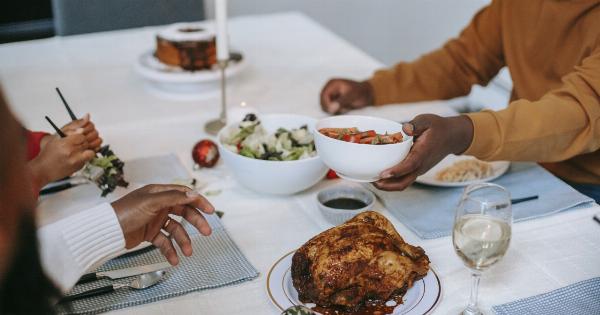The holiday season is a time to come together with friends and family, enjoy delicious food, and create lasting memories. However, sometimes the conversation at the dinner table can get out of hand, leading to arguments or hurt feelings.
Here are 30 ways to keep your holiday table conversations under control:.
1. Establish Ground Rules
Before dinner begins, discuss with your guests what kind of behavior and language is acceptable at the table. This could include a ban on political discussions or certain topics that are likely to lead to conflict.
2. Have a Neutral Moderator
Designate someone at the table to be in charge of keeping the conversation focused and the mood positive. It could be the host or someone else who is respected by all the guests.
3. Avoid Alcohol
While a glass of wine or cocktail can be enjoyable, too much alcohol can lead to loose lips and conflict. Encourage your guests to drink responsibly and limit their alcohol intake.
4. Stay Away from Hot-Button Issues
It can be tempting to discuss current events or controversial topics, but it’s best to avoid them altogether. Stick to lighter, more positive subjects like travel, food, or holiday memories.
5. Don’t Gossip
Gossiping or speaking poorly about other people can lead to hurt feelings and cause tension at the table. Encourage your guests to stay positive and focus on the joyful spirit of the holiday season.
6. Listen More Than You Speak
When someone is speaking, give them your full attention and avoid interrupting or speaking over them. This can help prevent misunderstandings and show your respect for their opinions.
7. Take a Deep Breath
If you feel yourself getting angry or frustrated with what someone else is saying, take a deep breath and count to ten. This can help you stay calm and respond in a more appropriate way.
8. Change the Subject
If a conversation is starting to escalate or become uncomfortable, steer the discussion in a new direction. Use a light-hearted joke or a question to shift the topic and bring the mood back to a more positive place.
9. Be Mindful of Your Language
Avoid using language that could be perceived as offensive or hurtful, even if you don’t mean it that way. This includes slurs, derogatory comments, or strong language.
10. Don’t Force Your Opinion
While it’s natural to want to express your opinion, try to do so in a way that doesn’t come across as aggressive or dismissive of others’ beliefs. Remember that everyone is entitled to their own perspective.
11. Respect Different Viewpoints
Even if you disagree with someone else’s perspective, show them respect and try to understand where they’re coming from. This can help prevent arguments and promote healthy discussions.
12. Keep Things Light
Use humor and light-hearted banter to keep the mood positive and keep people engaged. Tell funny stories or share anecdotes to keep the conversation flowing.
13. Avoid Personal Attacks
Never use personal attacks or insults to make a point. This can be hurtful and lead to long-lasting resentment.
14. Stay Calm
If someone says something that upsets you, do your best to stay calm and respond in a measured way. This can help prevent the conversation from getting out of control and keep the mood positive.
15. Keep the Focus on the Meal
Remind your guests that the purpose of the gathering is to come together over delicious food and celebrate the holiday season. This can help keep the conversation centered on positive things.
16. Keep the Conversation Balanced
Don’t let one person dominate the conversation. Encourage quieter guests to speak up and share their thoughts, too.
17. Offer Compliments and Praise
Spread positivity by offering compliments and praise to your guests. This can help everyone feel appreciated and valued.
18. Don’t Interrupt
Avoid interrupting someone when they’re speaking, even if you want to share your thoughts. Wait until they’re finished before adding your own comments.
19. Don’t Be Overly Critical
Avoid being overly critical of the food or decor. Remember that the host likely put a lot of effort into creating a beautiful and delicious meal for everyone to enjoy.
20. Don’t Take Things Personally
If someone says something that upsets you, try not to take it personally. Remember that everyone has different perspectives and experiences that shape their opinions.
21. Practice Active Listening
When someone is speaking, give them your full attention and try to understand their point of view. This can help prevent misunderstandings and show that you value their opinion.
22. Take Breaks
If the conversation is starting to become heated or tense, take a break. Offer to take a walk or suggest playing a game to lighten the mood.
23. Don’t Judge
Avoid judging other people’s opinions or actions, even if you strongly disagree with them. Everyone has their own reasons for thinking or acting the way they do.
24. Stay Positive
Focus on positive aspects of the holiday season, like spending time with loved ones and indulging in delicious food. This can help keep the mood light and joyful.
25. Give Everyone a Chance to Speak
Make sure that everyone at the table has a chance to speak and share their thoughts. This can help prevent one person from dominating the conversation.
26. Use “I” Statements
When sharing your own thoughts and opinions, use “I” statements instead of “you” statements. For example, say “I feel strongly about this issue” instead of “you’re wrong.”.
27. Be Open-Minded
Try to keep an open mind and consider other people’s perspectives, even if they’re different from your own. This can promote healthy, respectful conversations.
28. Focus on Solutions, Not Problems
If a discussion starts to become negative or critical, steer the conversation toward potential solutions. This can help promote productive, positive discussions.
29. Keep the Conversation Appropriate for All Ages
Remember that children and young adults may be present at the dinner table. Keep the conversation appropriate for all ages and avoid using language or discussing topics that could be inappropriate.
30. End on a Positive Note
As the meal winds down, end on a positive note by expressing gratitude for the time spent together and the delicious food. This can leave everyone feeling happy and content.































